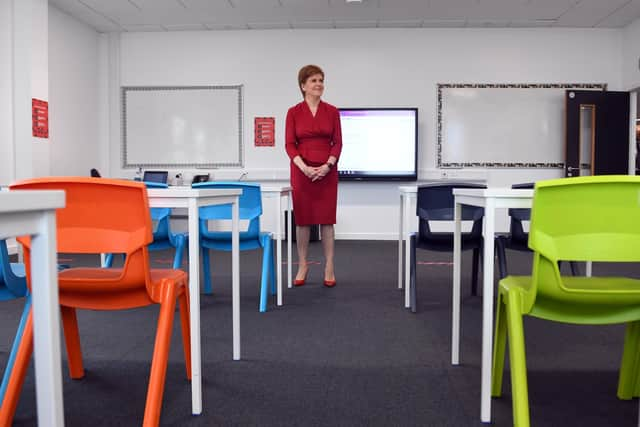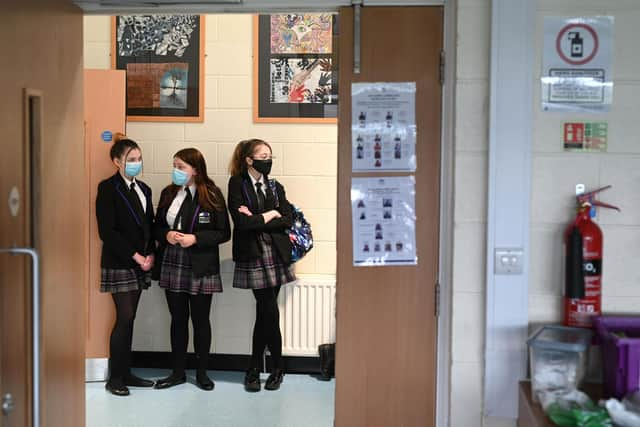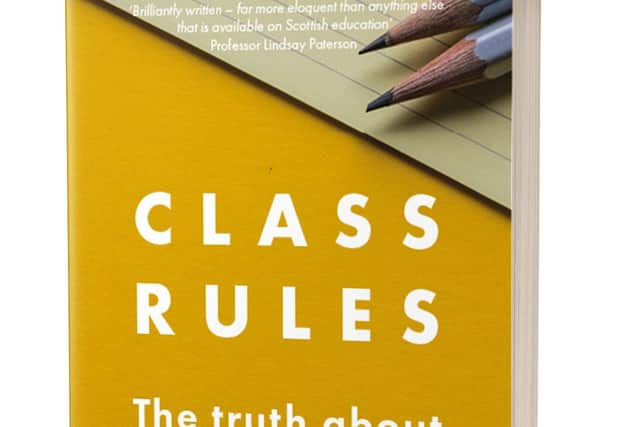Nicola Sturgeon has 'clearly failed' on education claims author
Teacher and writer James McEnaney also accuses the Scottish Government of “weaponising” children and education, and warns it cannot “afford to waste another five years” in making the changes required to close the attainment gap.
The 34-year-old, who teaches in further education in Glasgow, says the Covid pandemic proved the education system could be flexible, and is urging the government not to revert to “how things were always done” when the public health scare ends.
Advertisement
Hide AdAdvertisement
Hide AdHis book, “Class Rules, The Truth About Scottish Schools”, is a 240-page race through Scotland’s educational history, with a focus on how statistics are used and misused to prove political theories, the creation and apparent failure of Curriculum for Excellence, a deep dive into the attainment gap, the impact of Covid on schools and recommendations of how to improve the whole system.


And while not party political, it is deeply political in its attempt to show policy flaws in how schools are run and the impact that has on children, parents and teachers, particularly those from and working in Scotland's most deprived areas.
Asked about Nicola Sturgeon' s demand in 2015 to be judged on her record of closing the attainment gap, he says: “On her record, on her terms, she has clearly failed. There's no other way to interpret the numbers.
“The data she created, the Achievement of Curriculum for Excellence levels, which replacing the SSLN [Scottish Survey of Literacy and Numeracy] was created very explicitly to allow people to hold her to account.
"They set targets for the attainment gap for levels four, five and six qualifications – and didn't meet them. Targets for literacy and numeracy gaps – they never got close. You know, there's no question that Nicola Sturgeon failed and it has come back to haunt her.


“But the thing is, this is what you get when you behave like this, if you're going to very blatantly and very deliberately try to further politicise education and turn kids into political weapons well hell mend you when it goes wrong.”
He adds: “What I think the really interesting question about 2015 and that whole narrative, is not has Nicola Sturgeon failed – because clearly she has – but did Nicola Sturgeon ever really think it was going to happen?
“Did she and her advisers sit there and think over the course of five years, we are actually going to completely undo the effects of poverty in education? I find it very difficult to believe they had that conversation. I think it's probably more likely that it was always just political.
Advertisement
Hide AdAdvertisement
Hide Ad“It was promising accountability, when you knew you never have any intention of being accountable. It was about the narrative. I don't really think it was at its core, an educational decision.”


McEnaney was approached by publishers Luath to write the book after his journalism, based on Freedom of Information requests to the government to wheedle out statistics on issues like the attainment gap, was making headlines and at times causing embarrassment to former education secretary John Swinney.
He believes problems, such as the algorithm used by the Scottish Qualifications Authority last year which saw exam results marked down for the poorest pupils, are the result of a “middle-class Scotland approach” and his book makes direct links between class and poor educational outcomes.
A former candidate for defunct left-wing party RISE, he admits he was never going to write a book which was not political, but says his own politics are far removed from that of his upbringing.
He grew up with his NHS scientist mother in a cul-de-sac in East Dunbartonshire. His parents had separated – his dad was a senior police officer – and his brother was severely autistic.
"I very much am the kind of person for whom the system works,” he admits. “I walked out of school with five As in my Highers without doing much work because exams worked for me.
"In terms of the politics I've never really been 100 per cent sure where it came from. My mum's not really political at all.
"But when I was 15, I went to Australia with my school. We spent a total of 10 days with two different Aboriginal groups. I still remember people sniffing petrol out of cans, living in corrugated huts, and I couldn’t wrap my head round it. I couldn’t understand why I was angry. What I was seeing was an entire people that had just been very deliberately obliterated. And as I got older I came to realise this was a state, a system, creating such enormous inequality and just not giving a s***. It had an impact.
Advertisement
Hide AdAdvertisement
Hide Ad"Also my brother is very severely autistic. He has stayed at a residential school since he was nine and as long as I can remember, that’s been part of it... being aware Michael would always need people to look after him, and that's society's job. So I suppose these are the kind of things that have made me what I am.
“And getting brought up Catholic and my reading of Catholicism has always been quite socialist. So maybe you take all of that and you go and start working on education and you see what it all looks like, and it doesn’t take long to become angry about the situation that your students find themselves, and how powerless you are sometimes to do anything about it.
“That you can have students who do absolutely work harder than anybody else, can be the most wonderful, dedicated, joyous kids you’ll ever come across and at the end of the year they’re counted as failures because of their circumstances. I don't know how you look at that and not be angry. I don't know how you look at that and not know the only way to address that is to address the inequality, which is doing all the damage in the first place.”
His anger is in the book, but he believes it can be used to effect change – and hopes Nicola Sturgeon and new education secretary Shirley-Anne Somerville read it, not least because it also contains a chapter on suggestions from teachers, parents and pupils.
"Scotland is fundamentally a very conservative country. This is not a radical country, this is not a particularly progressive country. But if we end up succumbing to the idea of ‘let's just get stability, let's just get back to normal, let's ignore all these issues in the old system, and just rebuild it anyway’, I think it'll be a terrible shame and a betrayal of the kids who have gone through everything they've gone through in the last two years, but also of all the ones who are coming.”
He adds: "There is a very, very definite chance to do something much, much better. And that's not just me, you know, a mad lefty saying that, the OECD report says the same thing and the International Council of Education Advisers report says ‘do not try to go back to normal’.
"There’s huge support for genuine reform amongst the teaching profession and I am increasingly convinced there is in wider society. The thing I am not confident about it the capabilities of the people who sit at Holyrood. I'm not convinced that Scotland's politicians are up to the job that they're good enough to be able to actually give us something much, much better.
"It is particularly frustrating because actually, if the SNP walked into Holyrood tomorrow and put forward a motion to increase the school starting age to seven, the Greens would support it, the LibDems would support it, Labour would not definitely oppose it, so that leaves the Tories and it could be done without them.
Advertisement
Hide AdAdvertisement
Hide Ad“So now is a chance to make things much, much, much better for kids in Scotland, so how is it not worth doing that? How is it not worth trying when we know so much is wrong and we can see it?
"Everybody knows the things in my book... the impact of poverty on education. You could actually have gotten on with sorting it after that whole “judge me on my record” moment, instead there’s been the sum total of zero progress in the last five years. We’ve wasted five years and we could really, really do with not wasting another five.”
Class Rules, The Truth about Scottish Schools, £9.99, is published by Luath Press and is available at the end of the month.
A message from the Editor:Thank you for reading this article. We're more reliant on your support than ever as the shift in consumer habits brought about by Coronavirus impacts our advertisers.
If you haven't already, please consider supporting our trusted, fact-checked journalism by taking out a digital subscription.
Comments
Want to join the conversation? Please or to comment on this article.